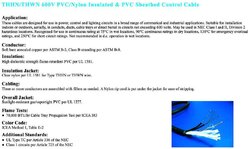Hello
What did you or would you do?
I am planning on a 2 foot trench but are those PVC conduits with the expansion joints really needed? Direct burial electrical wire OR THHN / THWN ??
Also should there be stones in the trench for drainage?
THW = Thermoplastic PVC-insulated building wire, Heat resistant +75°C/+167°F, for Wet and dry locations, flame retardant
THHN = Thermoplastic PVC-insulated building wire, Nylon jacket, +90°C/194°F, 600 V, for dry and damp locations
http://www.caledonian-cables.net/download/THHN-THWN PVC-Nylon Insulated PVC Sheathed Cables.pdf
Here is what some people did.
http://www.diychatroom.com/f18/opinion-would-you-choose-bury-wire-run-conduit-shed-45275/index2/
Click pic to enlarge
What did you or would you do?
I am planning on a 2 foot trench but are those PVC conduits with the expansion joints really needed? Direct burial electrical wire OR THHN / THWN ??
Also should there be stones in the trench for drainage?
THW = Thermoplastic PVC-insulated building wire, Heat resistant +75°C/+167°F, for Wet and dry locations, flame retardant
THHN = Thermoplastic PVC-insulated building wire, Nylon jacket, +90°C/194°F, 600 V, for dry and damp locations
http://www.caledonian-cables.net/download/THHN-THWN PVC-Nylon Insulated PVC Sheathed Cables.pdf
Here is what some people did.
http://www.diychatroom.com/f18/opinion-would-you-choose-bury-wire-run-conduit-shed-45275/index2/
Click pic to enlarge




